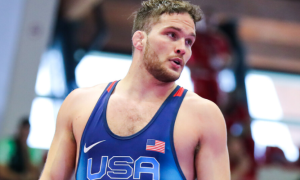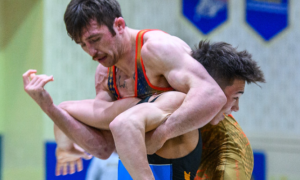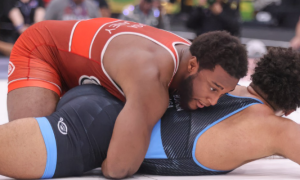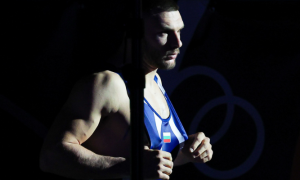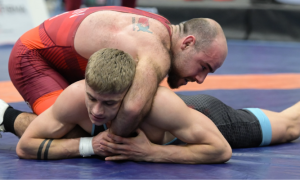“Okay, let’s get tired.”
A simple few words, uttered inwardly, and Ben Sanchez would be just fine. The self-directed manifesto acted as his primer for competition. He would mentally agree to “get tired” and go slap hands.
Originally from Massachusetts, Sanchez broke onto the Greco-Roman scene by enrolling at Northern Michigan University’s then-United States Olympic Education Center. Upon entering the sport on such a large scale, he quickly became acquainted with the relative cost of doing business. Beatdowns were — and still are, and always shall be — a featured part of the curriculum. Sanchez absorbed technical lessons, because mostly everyone does. But he had other hurdles to clear. In order to harden himself for the journey, Sanchez decided that it was necessary to pursue fatigue. Why expect anything different?
The way Sanchez saw the whole deal, it made far more sense to dive right into misery because, at least then, there would be no surprises. If one purports to control only what is indeed controllable, options are inherently lacking. For Sanchez, the premier item over which he wielded any control was his own effort. And since he could control effort, he felt compelled to push those limits. Ceaselessly so.
NMU is where he discovered this customized blueprint. First, under Ivan Ivanov and Jim Gruenwald; later, Dennis Hall. Sanchez would years hence zoom out to Colorado Springs’ Olympic Training Center, but the foundation was built at Northern. Sanchez’s transformation from promising tough guy to consistent National-level contender unfolded in Marquette. In Springs, the bar was already raised. He looks back at NMU and, almost in an instant, his mind stops on Gruenwald and Hall. Sanchez has a place in his heart for all of his coaches, which is one reason why he was sure to include others besides the two legendary shrimps in his dialogue.
But Gruewald and Hall stood out the most because their methods and manners of speech, while vivid in their deviations, appealed intimately to Sanchez’s mental approach to competition. It was not just what happened in the room for Sanchez, or what tactics and techniques were drilled. It was much more about the goings-on in the room carrying over to match day, and how that was communicated when the score was actually being kept.
IN THE CORNER VOL. 2 – Ben Sanchez
THE VOICES
Dennis Hall (fmr. Northern Michigan/USOEC head coach)
Jim Gruenwald (fmr. Northern Michigan/USOEC assistant coach)
“The thing with me as an athlete is that I had a lot of different coaches throughout my career, which is great. But they all had different styles in the corner. You have some coaches who are really muffled; you can hear them, but can’t make out what they’re saying. You have other coaches who have a lot of energy. When you walk to the corner, they need to be fanned off, too. You feel their raw emotions. You can hear them, and you can feel them. It’s hard to explain. It is like they are there wrestling right along with you.
“When we would go to Universities (University Nationals or Trials), it was basically Northern Michigan versus the rest of the country. We would often see a teammate, be it in the quarters, semis, or the finals. Well, if it were two Northern guys going against each other, Ivan, Jim, or any other coaches wouldn’t be in the corner. You’d have a teammate. You wanted your guy, your training partner. I’d include Kerry Regner in the category of guys who were fantastic corner coaches. You wouldn’t want to wrestle a guy Kerry was cornering because I’m probably going to give him more than the guy who was in my own corner. Unless it was Dennis Hall or Jim Gruenwald. You know what I mean?
“It was about fitting my style. I would always put in my head, Okay, let’s get tired. This happened probably as a defense mechanism after getting my ass kicked for so many years after I first got to Northern. First, you developed your defense; then you started developing some offense as you progressed. One thing that always stayed the same was that you were going to get tired. It’s Greco, you know? There is no way to avoid it. You are going to get tired. So, I started to embrace it a little bit more. As I went along further in my career and became more mentally mature, it became a constant. From the time I was getting my ass kicked to — I don’t want to say kicking ass — scoring points and winning, was ‘get tired’. I would just go into a match, Okay, get tired.
“What helped me break those barriers was Dennis or Jim, someone who would be in your corner and feed you a lot of positive reinforcement. It was one of those things for me that helped the most.
The biggest difference between the two was their choice of words. The reason why Dennis might come to mind first is because I turned the corner during the time when he was my coach. Dennis I would consider to be very straight to the point. I would consider it barbaric and he did not care what came out of his mouth. It was the purest form of raw. Animalistic. Just very raw. It was what I resonated with, such as how I grew up, my dad’s side of the family… Just different things. Dennis wasn’t going to say, Okay, just go out there and do this or that. No, it was going to be, Go out there and kick the s*** out of this guy. That was all he would need to say and it would be, Yes, you got it.
“Meanwhile, Jim would eloquently word things. He was very well-spoken, but just as enthusiastic. It is just their approach. Very energetic, and they were there. The sky could be falling, but they are there with you on that mat. Their focus is you, and on winning.
“They might insist on a technique or position, but it was more than that. 2010 was when I took third in the Nationals, which was also when it felt like for me that I had turned the corner. A lot of that had to do with my experience by that point, but also what I acquired from Ivan and Jim. Then Dennis contributed to that.
“I remember in that ’10 Nationals. I walked over to the corner and Dennis was real adamant once I got there. He said, ‘Get back on that two-on-one, don’t you let go of it.’ That brought me back to when I first got to Northern with ‘dog on a bone’. I remember thinking, I’ve got to get back to it. And then I combined that with what Ivan had taught me about two-on-ones, and carried it with me during Dennis’ year in Northern. I continued to work on that with different training partners under him. It was just, Right, get back to it. Get back to the two-on-one, get back to the two-on-one. Whatever comes from it, we’ll cross that bridge once we get there. As simplistic as it might seem, that’s what it was: ‘Get back on that two-on-one’. And also, ‘Keep moving your feet’, which he probably said dozens of times during a match.
“A big part of Dennis and Jim isn’t necessarily what they said, but how they made me feel during the heat of battle. I remember that more than anything they had to say.
“My personal approach was, How can I have the most physical output for as long as possible. That’s how I trained, it was how I thought. I wasn’t going to waste my time, so their corner coaching style resonated with my own individual training philosophies. It’s why I gravitated towards them.
“I would find myself wrestling how I trained. It was like working out. I listened to certain songs that I knew would trigger an emotional response for me. Some people might call it a “runner’s high”, but I’d feel myself get stronger. I conditioned myself this way for a long time. I don’t think a lot of people know this, but when I trained I would do these things. See, I wouldn’t have control over the music that played when I was wrestling in a tournament. Only when I was lifting, cross-training, or doing something else. For example, I would try to stimulate that kind of response over the last 100 meters, or on the last rep, or the last drill of a training session. Having their positive reinforcement would facilitate almost that same response during a match, and it would almost always happen once I got tired — because that’s how I trained. When I would hit these walls — for whatever reasons, biologically, mentally — the positive reinforcement they provided helped me push through those walls. The first :50 of a match or the last :50, I don’t know. But because they were giving me their all, it helped stimulate me to give my all when I was wrestling.”
Influence & Behavior
“Since I’ve stepped away from competing I have tried to give back to wrestling by coaching in some capacity. I focus a lot on the mental aspects of the sport. Different things any athlete from any sport could apply to themselves. Momir (Petkovic) had a big impact on me in this regard, as well, because a big part of his style was mentality. He was a very ‘go with’ guy. A man of few words. He was like men in my family. If you’re going to do it, do it right, and get it done. He would focus so much on mentality that it helped me think outside of the box.
“What helped when becoming a coach and taking all that in was focusing a lot more on mentality and implementing these concepts with my athletes. Like, If you’re going to do it in a match, make sure you’ve done it in practice thousands of times. I’ve preached about the ‘10,000-rep rule’. I’m really big on tapping into the mindset side in an all-inclusive format. I am into including the mentality aspect with the technical concepts. I think that is very important because if you can tap into someone’s psyche, you can get them to do all sorts of things. If they really aren’t honed in on their own psyches, then they might take that ‘10,000-rep rule’ and make it 9,500. Well, that’s 500 reps less, you know?
“I have taken little pieces of the puzzle from Dennis, Jim, a piece from Ivan, one from Coach (Rob) Hermann, Momir, Steve Fraser… Even Mohamed (Abdelfatah). I find myself as a coach taking a little bit from everyone else. But when it comes to actual corner coaching I find myself being 180, believe it or not. It’s quite ironic. It might be the demographic I coach. It’s more developmental, so for me to have them make adjustments and do those types of things I required as an athlete is a little different.”
In the Corner

Listen to “5PM50: Mr. Fantastic Benji Peak” on Spreaker.
Listen to “5PM49: Robby Smith on coaching, fatherhood and mentors” on Spreaker.
Listen to “5PM48: Austin Morrow and Gary Mayabb” on Spreaker.
SUBSCRIBE TO THE FIVE POINT MOVE PODCAST
iTunes | Stitcher | Spreaker | Google Play Music

Notice: Trying to get property 'term_id' of non-object in /home/fivepointwp/webapps/fivepointwp/wp-content/themes/flex-mag/functions.php on line 999




